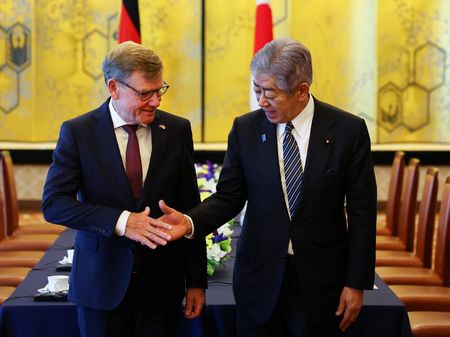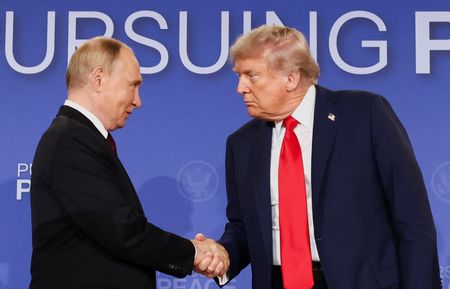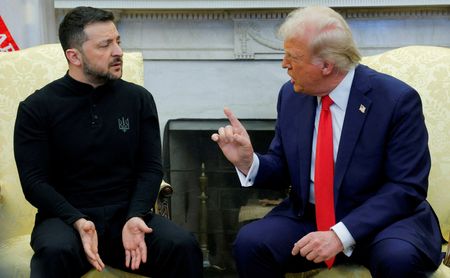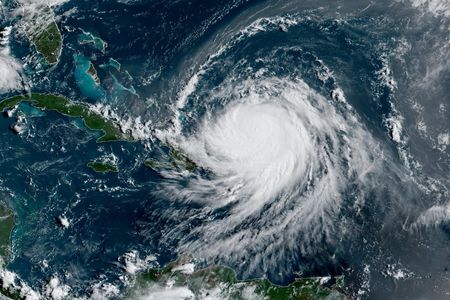By Sabrina Valle
NEW YORK (Reuters) -Bankers and CEOs hit the brakes on mergers and acquisitions after U.S. President Donald Trump launched a global trade war on April 2, with fewer deals getting signed than during the bleakest days of the COVID-19 pandemic and the 2008-2009 global financial crisis.
The number of M&A contracts announced across the world – an indicator of global economic health – fell in April to the lowest level in more than 20 years, according to data compiled by Dealogic for Reuters.
In the U.S., the world’s largest M&A market, just 555 deals were signed last month, the fewest for any month since May 2009.
Trump’s self-styled “Liberation Day,” when he announced tariffs against all countries, caused global markets to slide, CEOs from Chime to StubHub to yank planned IPOs and retaliatory measures from other nations.
Uncertainty has also prompted bankers, who earn fees and bonuses from facilitating deals, to tell clients to hold off on M&A and initial public offerings until there is more clarity and consistency on U.S. policy.
“I advise clients to wait,” said Lorenzo Paoletti, a managing director of investment banking at Truist Securities. “CEOs and CFOs haven’t fully understood how tariffs will hit them yet, so it’s better to keep cash on hand” until more clarity emerges.
Bankers expected 2025 would be a stellar year for M&A under a pro-business Trump. But deal signing across the world fell off a cliff after his tariff plan tipped off the global trade war, reaching 2,330 deals in April, the lowest since February 2005 and 34% below the historical monthly average.
A few big deals, including Global Payments’ $24.25 billion acquisition of a card processing and account services firm in April, helped buoy an otherwise moribund start to the year.
That was not enough, however, to keep the value of global M&A activity from slipping to $243 billion – about 54% below March and 20% below the monthly average over the last 20 years, the Dealogic data shows.
“We are seeing a chain reaction in all of the diligence that we are doing,” said Kristin Pothier, a global deal advisory and strategy leader at KPMG consultancy firm.
The tit-for-tat trade war caused market volatility to spike to historic levels in April, “driven by on-again, off-again statements from the White House around tariff policy,” said Morgan Stanley analyst Lisa Shalett.
On April 2, Trump imposed and then paused for 90 days a minimum 10% tariff on all U.S. imports, and higher percentages to dozens of key partners from Europe to Japan, including levies on China that added up to 145%.
Trump’s threats to fire U.S. Federal Reserve Chairman Jerome Powell, which called into question the Fed’s political independence, further exacerbated stress in the markets, Shalett said.
There was one bright spot for M&A last month: tech deals in which value lies more in intellectual property like algorithms and software than in physical goods subject to tariffs, like autos.
The technology industry has been responsible for almost 40% of the nearly $600 billion in deals signed this year in the U.S. The country accounts for almost half of global deal activity by value.
Uncertainty has been affecting industries differently.
Telecom, media, services, oil and gas and utilities are sectors less affected by the tariffs, while some areas of industrials, healthcare and technology are facing larger changes in their business model due to the tariff announcements, said Kevin Cox, global head of M&A at Citi.
“Anyone that is a manufacturer, either taking inputs from abroad or sending finished product abroad, is going to be affected,” Cox said.
His team is telling clients to take their time to understand the additional risks of a target’s business model and its expected returns.
The bank advised Boeing on its April 22 sale of flight software subsidiary Jeppesen to Thoma Bravo for $10.6 billion, in what was considered a tech deal.
“Volatility impacts transactions,” Cox said. “Buyers must price in this additional risk, or step back and wait for the situation to be known.”
(Reporting by Sabrina Valle in New York; Additional reporting by Emma-Victoria Farr in London; Editing by Dawn Kopecki and Matthew Lewis and Chizu Nomiyama)











